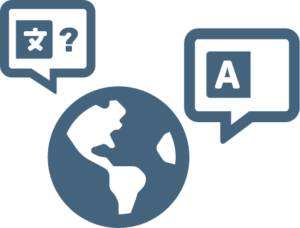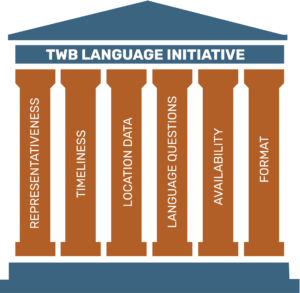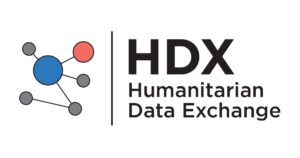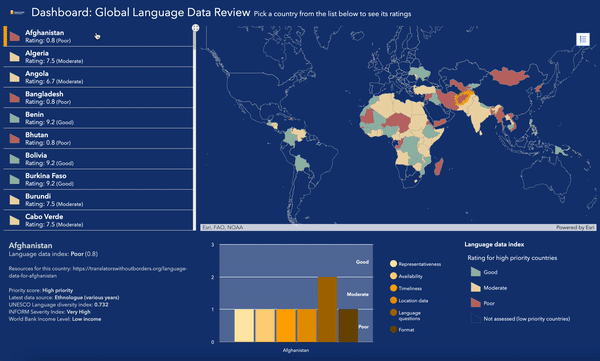LANGUAGE DATA BY COUNTRY
32 countries | 69 datasets | 91 maps
 |
Click on a country on the map below to see language data, resources, and maps that we have available for that country. This map will update as new data is published in the future. |
Note:
Administrative divisions and names used on maps and other presentations are sourced from UNOCHA, as published on the Humanitarian Data Exchange, and reflect that source at the time of publication. They do not imply any opinion of CLEAR Global/Translators without Borders concerning the legal status of any country, territory, city or area or of its authorities, or the delimitation of its frontiers or boundaries.
Africa
Benin
Cameroon
DRC
Ethiopia
Guinea
Malawi
Mali
Mozambique
Nigeria
Senegal
Somalia
Sierra Leone
Zambia
Americas
Bolivia
Colombia
Ecuador
El Salvador
Guatemala
Nicaragua
Peru
USA
Asia
Afghanistan
Armenia
Cambodia
India
Indonesia
Nepal
Pakistan
Papua New Guinea
Philippines
Thailand
Europe
Ukraine
Find, share and use the datasets for all countries listed above on the Humanitarian Data Exchange page.
The datasets are all available in .xlsx and .csv formats on HDX, and detailed metadata clearly states the source of each dataset along with known limitations.
We have made all of these datasets available under a Creative Commons Attribution Noncommercial Share Alike license (CC BY-NC-SA-4.0). This means that you are free to use and adapt them as long as you cite the source and do not use them for commercial purposes. You can also share derivatives of the data as long as you comply with the same license when doing so.
The availability of operational data on languages around the world is in bad shape.
Existing data is often protected by restrictive copyright or locked behind paywalls. Plus languages coexist and overlap in the real world, but are often visualized as uniform blocks or specific points on a map.
In other cases, quality data exists but people planning and delivering services may not know where to find it or how reliable it is.

These are the first openly available datasets for humanitarian and development use.
Language data for planning should be:
- representative
- recent
- reliable
- readily accessible
- at a relevant level of detail for program design
Good language data helps enable services that include speakers of marginalized languages. Where that data is unavailable or unused, services risk reinforcing existing exclusion – leaving disadvantaged groups behind.

For more information on the state of language data globally, explore our Global Language Data Review Dashboard.
How can you help?
This is just the beginning of our effort to provide more accessible language data for humanitarian purposes. Our goal is to make language data openly available worldwide, and we can’t do it alone.
We need your help to:
Integrate and share this data.
Our strategy is to make these datasets as accessible and interoperable as possible using existing platforms. But we need your feedback so we can improve and expand them.
Add language-related questions into your ongoing surveys.
Existing language data is often outdated and does not necessarily represent large-scale population movements. We have successfully worked with partners to integrate standard language questions into ongoing surveys. This is essential if we are to develop language data for the countries that don’t have regular censuses. We’ve developed a set of standard questions that can be included in any survey.
Use this language data to improve communication strategies.
As we develop more data, we hope to provide the tools for service providers to design more appropriate communication strategies. Decisions to hire interpreters and field workers, develop radio messaging, or create new posters and flyers should all be data-driven. That’s only possible if we know which languages people speak and their preferred means of communication. An inclusive and participatory system requires two-way communication strategies that use languages and formats that people understand.


